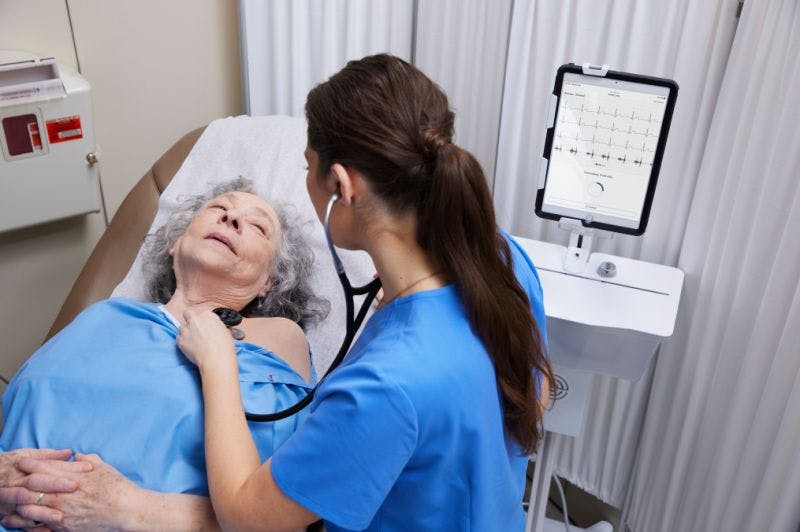Catching heart issues earlier with an AI stethoscope
The simplest, most recognizable clinical tool just got a little bit smarter.
Digital health company Eko Health has developed the Eko Sensora, an AI-enabled stethoscope and platform for improved heart murmur detection.
And now, NCH in Naples, Florida is the first health system in the U.S. to use the Eko Sensora platform for patient care.
The aim is to help technicians and physicians catch heart murmurs at routine patient visits, enabling patients without exhibited cardiac symptoms to get flagged with potential heart problems, like valvular heart disease (VHD).

How does Eko’s technology work?
The clinical rollout comes just a few months after Eko launched the Sensora platform in the U.S. and published a study demonstrating the technology’s performance with real patients.
The company’s digital stethoscopes work hand-in-hand with an algorithm trained to identify and distinguish between types of heart murmurssuch as systolic versus diastolic murmurs.
The study, which compared the effectiveness of standard, analog stethoscopes with that of the Eko stethoscopes and platform, found that the latter was found to detect signs of VHD in previously-undiagnosed patients with a 94% sensitivity. This compares to a 41% sensitivity for standard stethoscopes. The Eko tech undovered 22 new VHD cases, while the analog devices found only eight.
What differentiates how the two stethoscopes work?
Instead of relying on a physician’s hearing, the Eko stethoscope feeds the sounds from the positions on a patient’s torso through the algorithm. It does so by sending a bluetooth signal from the stethoscope to an iPad in the exam room, which connects to the Sensora platform. The real-time analysis is then available within seconds of completing a standard four-point stethoscope exam.
Eko has cited studies that indicate around half of adults over age 65 may have some form of VHD, which can progress to severe disease quickly if left untreated.
“The implications of undiagnosed or late diagnosis of valvular heart disease are dire, as well as costly to our health system,” said lead researcher Dr. Moshe Rancier. “This study demonstrates that patients can be more effectively evaluated for VHD in primary care by augmenting the standard cardiac exam with AI-enabled technology.”
Our perspective: Giving familiar tools an upgrade
One of the most exciting aspects of Eko’s innovation is how seamlessly the technology fits into a patient’s regular physical exam.
Yes, the use of the Sensora software on the Bluetooth-connected iPad may be new, but the stethoscope exam is not. Both patient and clinician are familiar with the process. That familiarity makes it easy for both parties to buy in and seamlessly adopt the new tool. It’s just an upgrade to what they already know and trust.
Making existing, trusted, familiar tools more effective and efficient continues to be one of our favorite approaches to medical innovation.
Another great example from recent headlines is the fax machine makeover from healthtech startup Tennr, which is featured in our Deals roundup this week. Yes, you read that right: Fax machines. A tool that digital health companies have tried to get clinicians to stop using, but which many healthcare companies continue to rely on because they’re comfortable with it.
Tennr saw that tendency and asked: How can we make fax machines work in our modern clinical world—instead of begging clinicians to get rid of them? As with Eko’s stethoscope, the answer they’ve come to is AI.
Whether we’re talking about patient referrals or diagnosing heart murmurs, the lesson we’re taking away is this: We don’t always need to reinvent the wheel to vastly improve patient care.